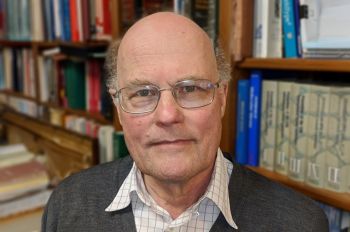Physics Professor Jeff Terry Speaks on Nuclear Security for Bulletin of the Atomic Scientists
Jeff Terry, professor of physics, spoke on the panel “Nuclear Security: After the Iran Deal, What’s Next for Nuclear Security?” at the Bulletin of the Atomic Scientists’ 6th Annual Clock Symposium at the University of Chicago on November 16. Other panelists were Sharon Squassoni, director and senior fellow, Proliferation Prevention Program, Center for Strategic and International Studies (CSIS), and Kennette Benedict, University of Chicago. The moderator was Robert Rosner, University of Chicago.
The Bulletin also selected physics postdoctoral student Daniel Velazquez and undergraduate William Limestall to take part in the workshop “Communicating Science to Policy Leaders and the Interested Public” on November 18.
During his panel, Terry noted that technologies for remote verification of Iran’s compliance with the new nuclear deal (Iran can only enrich uranium to 3.67 percent) are in their infancy. More research and development will be needed to ensure that new monitoring capabilities can be brought online over the 15-year timeframe of the agreement. Possible areas to explore include better detection of antineutrinos emitted from nuclear reactors and the use of muon tomography to detect special nuclear materials. Terry also spoke on the need to reduce the global stockpile of plutonium in fast reactors, as Australia is currently exploring.
The Bulletin was started by former Manhattan Project scientists after the United States dropped atomic bombs on Hiroshima and Nagasaki. It is best known for its Doomsday Clock, which is meant to show how close we are to destroying our civilization. Each year, the Clock Symposium brings together leading science and security experts to discuss pressing issues, with a focus on nuclear security and disarmament, climate change, changing energy landscape, and emerging technologies. The celebration of the 70th Anniversary of its founding attracted 200 people to the daylong symposium and 250 people to a dinner at the Museum of Science and Industry. Discussions focused on the recent Iran nuclear deal and December’s international climate negotiations in Paris.
In addition to participating on the panel, Terry also met and spoke with Jerry Brown, the governor of California, about energy issues. Keynote speakers included William Perry, former U.S. Secretary of Defense, and Leonard Krauss, chair of the Bulletin’s Board of Sponsors, theoretical physicist and cosmologist, and Foundation Professor of the School of Earth and Space Exploration at Arizona State University.




